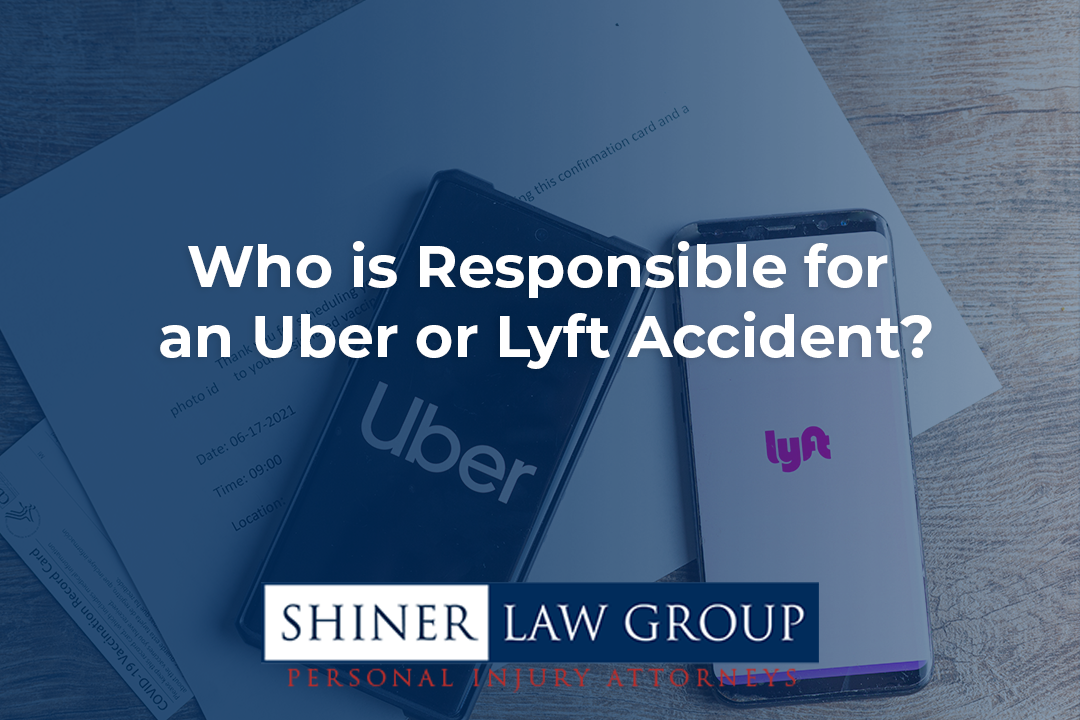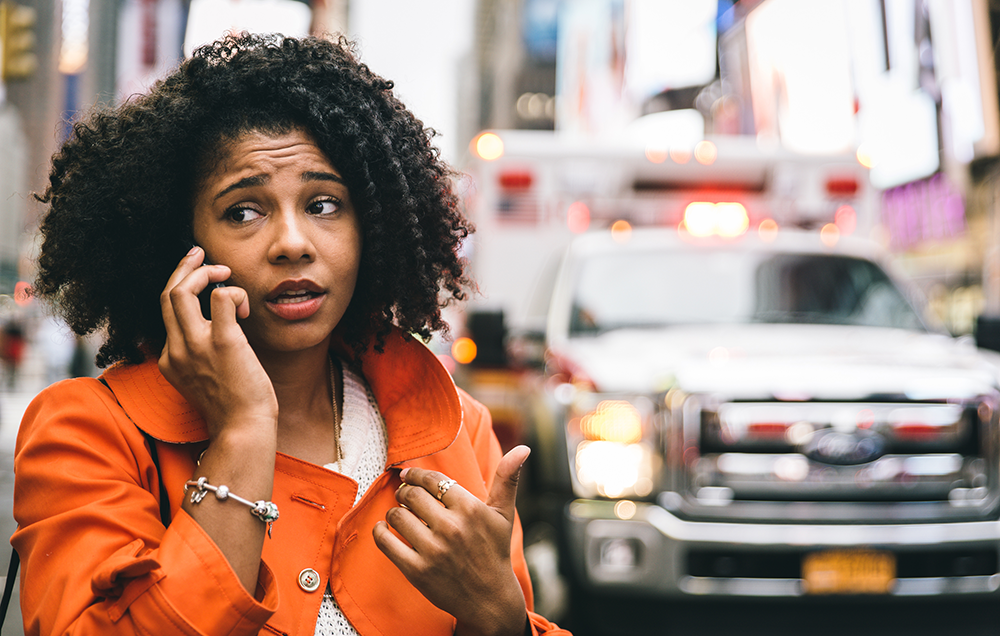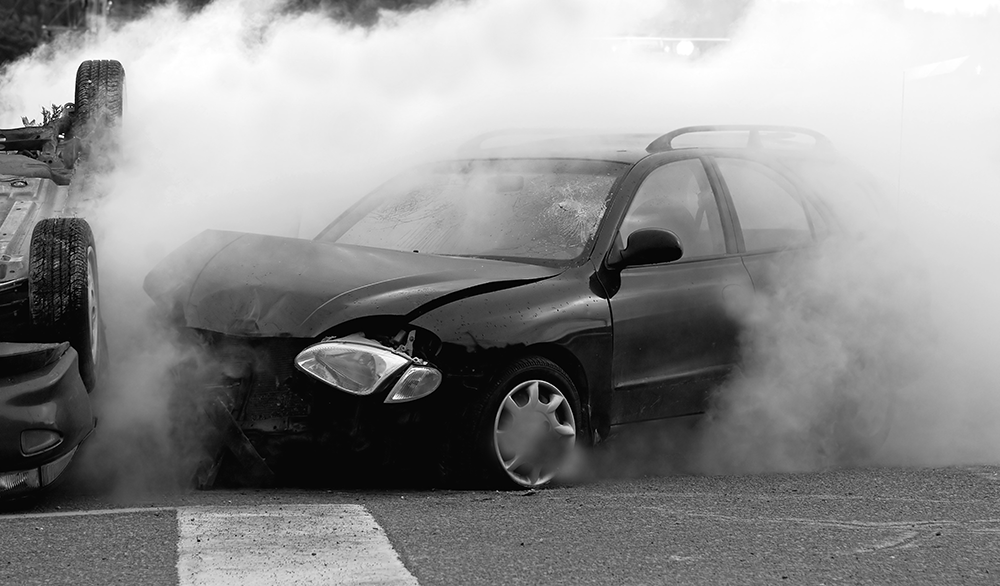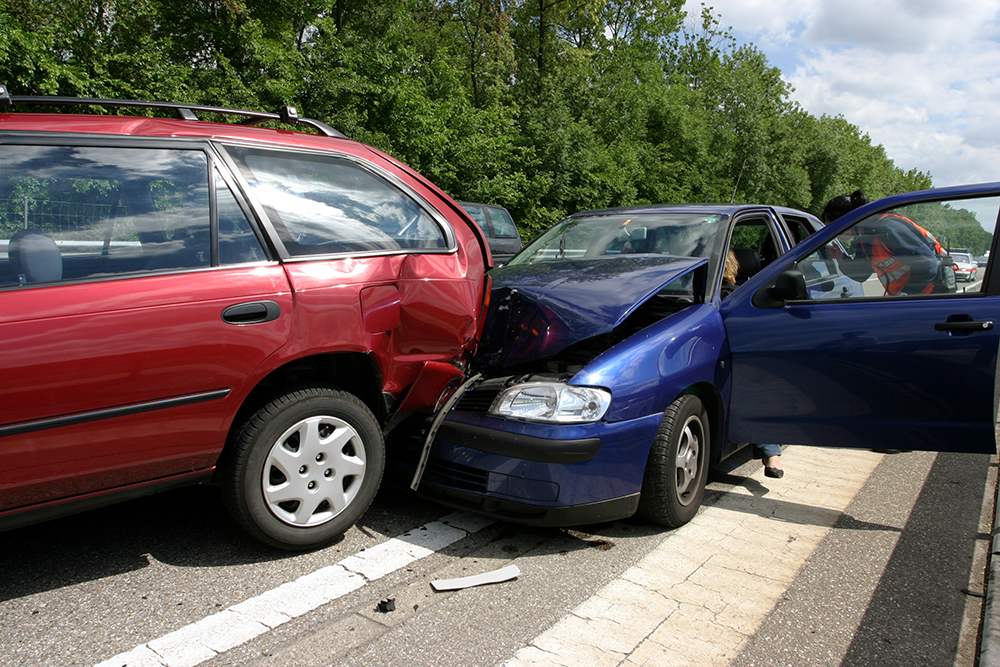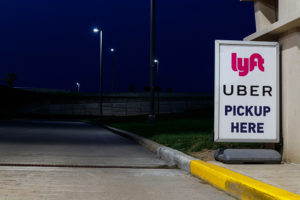
The popularity of Uber and Lyft rideshare companies has increased since both entered the transportation industry in 2009 and 2012. Riders appreciate the convenience of arriving at their destination stress-free. However, that changes if an accident occurs.
According to Uber, 99.9% of rides end safely without an incident. However, it only takes one accident to turn your life upside down. Drivers of rideshare vehicles are just as likely as other drivers to be involved in accidents.
What You Should Expect When Using a Rideshare Service
Operating a vehicle with due care is the responsibility of every driver on the road. This includes drivers of Uber and Lyft services. Legally, that care is defined as what a reasonably cautious driver does under similar conditions.
The driver is responsible for your safety while using their service. If a breach of this duty by the driver causes an accident, they are liable for any damages resulting from this breach.
Still, knowing what to do after an accident during an Uber or Lyft ride can be confusing. At a minimum, the driver is required to carry liability insurance. However, is the driver or the rideshare company responsible?
Usually, negligent acts by the rideshare driver lead to accidents. Like any other driver, these accidents can cause severe injuries to passengers.
As a passenger, you are entitled to compensation when a rideshare accident occurs. Speak with a rideshare accident attorney to understand your rights and for help getting the compensation that you deserve.
Examples of Driver Negligence in Uber or Lyft Accidents
People who fail to use reasonable care make bad choices when driving a rideshare vehicle. Although those choices vary, their actions constitute the legal definition of negligence. Some of those choices include:
- Distracted driving. Smartphones, navigational aids, and entertainment systems can improve the driving experience for drivers and riders. Unfortunately, the convenience of these tools also makes it too easy for drivers to become distracted. These distractions lead to thousands of injuries across the country. Holding distracted drivers accountable encourages safer driving habits.
- Failure to control driving speed. Attentive drivers know to adjust their speed according to current road conditions. However, drivers who fail to do so contribute to collisions. Their actions could be considered negligent even when they stayed below the posted speed limit.
- Traffic light violations. Attempting to save time by beating a yellow light or running a red light are not the only ways to violate traffic lights. For example, making a right turn on red or performing tricky maneuvers can cause vehicle collisions.
- Impaired driving. Rideshare drivers are not exempt from staying sober while operating a vehicle. Impairment includes not only alcohol but also some medications that affect driver behavior. Even if the behavior does not lead to criminal charges, the driver could be held civilly liable to compensate victims for their injuries.
Steps to Take After an Accident in a Rideshare Vehicle
Accidents that occur with rideshare vehicles are similar to other types of auto accidents. Yet, the challenge comes with determining who should be responsible for the accident and who should pay compensation to injured parties.
To ensure your rights are protected, there are crucial steps to take immediately following a ridesharing vehicle accident. You want to proceed as you would in the aftermath of any vehicle accident. The first thing you want to do is to safely gather as much information as possible.
Contact Information from Witnesses and Involved Parties
Take photos of license plates and driver’s licenses. Gather names and phone numbers of drivers and witnesses. This includes information from the Uber or Lyft driver. Make sure you also get vehicle identification numbers and collect insurance cards.
Take Photos of Accident Scene
Document as many details of the accident as possible, including:
- Vehicle damage
- Road and weather conditions
- Accident location
- Any visual obstacles
- Physical injuries
File a Police Report
Call 911 if you are injured and wait for the police to arrive. File a report that documents details of the accident and your injuries. Request a copy of the police report, as this will be vital evidence for your case.
Seek Medical Attention ASAP
Even if you do not feel pain, seeking proper diagnosis and treatment from a medical professional is very important. The severity of injuries is not always immediately apparent. Therefore, a thorough evaluation is not only essential for an insurance claim or lawsuit but also for your health.
Filing a Claim After the Accident
Filing a vehicle accident claim requires showing who was at fault for the accident. Additionally, the claim must show how you were harmed by the accident. Typically, the driver who caused the crash, or their insurance company, is liable for your damages that may include:
- Lost wages
- Medical expenses
- Pain and suffering
- Other losses related to the accident
Being in an accident with an Uber or Lyft driver can complicate the situation. Most auto insurance policies do not cover a vehicle involved in an accident during commercial use.
With a ridesharing policy or endorsement, the personal insurance policy will not cover a ridesharing accident.
All is not lost. Fortunately, Uber and Lyft offer liability insurance to drivers. As a result, policy coverage begins when drivers make themselves available for ride requests by logging into the apps.
Insurance Policies for Rideshare Companies
Uber and Lyft provide up to $1 million of third-party liability insurance coverage that might benefit ridesharing accident victims. Before determining who is at fault, the insurance providers of all drivers involved in the accident will conduct investigations.
In some cases, who is at fault is clear. In other cases, the insurance company will dispute liability claims and refuse to accept liability. If an insurance company’s investigation undeniably shows that its driver caused the accident, it will still want to negotiate the value of your personal injury claim.
An experienced rideshare attorney can guide you through this intimidating process and represent your interests before the insurance company. Establishing liability and recovering the damages that you deserve might require filing a lawsuit.
Ultimately, who is responsible for an Uber or Lyft accident may depend on what the rideshare driver is doing at the time of the accident. Typically, accidents that happen when the rideshare driver is either providing a ride or traveling to pick up a passenger are covered. In addition, coverage includes compensation for physical injuries.
Both companies will provide this liability coverage. However, these policies are subject to frequent changes. Even without changes, a rideshare driver’s behavior determines whether these policies apply.
For instance, a driver may have the rideshare app active while waiting for a ride request. However, the driver is still considered to be on duty. Uber and Lyft will cover $50,000 per person for bodily injury, $100,000 for bodily injury per accident, and $25,000 for property damage when the rideshare driver’s personal insurance is unresponsive.
Insurance companies are collecting premiums and paying as little as possible on accident claims. So, having a million-dollar liability policy may sound like a lot. However, that does not mean the insurance company will happily write a check to cover your expenses.
Insurance companies will not hesitate to use tactics to help them avoid financial liability. Therefore, it is advisable to have a rideshare attorney who will work just as hard on your behalf.
Examples of State Regulations Governing Uber and Lyft Accidents
Much of the battle for compensation rests on who is at fault for an Uber or Lyft accident. Regulations vary by state but generally rely on similar standards for determining who should be held responsible for your accident.
Florida
A new law in Florida places ridesharing companies in the same category as the rental car industry. Essentially, ridesharing vehicles must be current with safety recalls operating on Florida roads. Owners and drivers are also expected to carry the state’s minimum insurance levels:
- $50,000 per person for bodily injury
- $100,00 per accident for bodily injury
- $25,000 for property damage
One notable change is that personal auto insurance policies cannot cover damages when a vehicle is used for business purposes. Therefore, ridesharing companies must provide drivers with commercial insurance coverage. Alternately, drivers can add commercial coverage to existing policies.
In Florida, the driver responsible for the accident can be held responsible for compensating the injured parties.
Georgia
The state of Georgia is an at-fault state regarding vehicle accidents. Therefore, if you are a rideshare passenger and suffer injuries from an accident caused by someone other than the driver, you will have to pursue compensation from the at-fault driver. Generally, no claims against the rideshare driver are allowed.
Alternately, you may have a claim against the rideshare driver’s insurance if they cause the accident. Like all Georgia drivers, Uber and Lyft drivers must have the state minimums of auto insurance coverage to provide compensation.
Of the three types of available insurance, the rideshare driver’s behavior determines which one will apply. Similar to other starts, this involves whether the driver:
- Is carrying a passenger
- Is not logged into the rideshare app
- Is logged into the rideshare app without passengers
Missouri
In Missouri, receiving compensation for an Uber or Lyft accident depends on several factors:
- You were a passenger in the rideshare vehicle
- You were struck by a rideshare driver
- You were injured in a crash as a bystander, cyclist, or pedestrian
Compensation could be $1,000,000 or more. However, Missouri’s statute of limitation can hamper your case if you wait too long to file a claim. Speak with an attorney as soon as possible to secure your rights and chances of winning a personal injury lawsuit.
New York
In New York, your $50,000 liability insurance is the first policy covering being in a car accident with an Uber or Lyft driver while driving your vehicle. After that, the $50,000 insurance coverage that the rideshare driver is required to have will kick in.
Add their $25,000 liability coverage for being at fault, and you may receive up to $125,000 in coverage for your injuries.
New York’s ride-sharing regulations cover insurance requirements and safety protocols. Even though the law requires criminal background checks, safe rideshare drivers may still have an accident at the least opportune time.
For this reason, drivers and Uber and Lyft must have insurance policies to cover accidents that happen while drivers are working. If a driver is working but not logged into the ridesharing app, their personal insurance is the only policy that can compensate accident victims.
When a driver is waiting for passenger requests while logged into the app, they must have at least $150,000 for bodily injury. The coverage is also for the unfortunate death of two or more people in the accident. The minimum amount for property damage is $25,000.
For accidents when a rideshare driver is completing a passenger request, insurance coverage should be at least $1.25 million for each accident to cover physical injury and property damage.
In addition, rideshare drivers must also have car insurance to satisfy no-fault laws. The policy must include Personal Injury Protection, or PIP, benefits in which the insurance company pays out regardless of fault. Generally, this policy coverage applies even when the policyholder is a passenger or pedestrian.
Exclusions may apply when the accident involves a rideshare vehicle. Therefore, it is crucial to work with someone familiar with the nuances of insurance policies involving a rideshare vehicle.
An experienced rideshare attorney can determine if you are automatically owed PIP or if it is necessary to file a lawsuit to receive full and fair compensation.
North Carolina
The state of North Carolina requires Uber and Lyft to carry a minimum of $1.5 million liability insurance policy per accident to cover drivers while they are on the clock. Other minimum insurance coverage requirements include:
- $50,000 or $100,000 per person
- $100,000 for two or more people
- $25,000 for property damage
Two scenarios govern how the coverage is used if a rideshare driver causes an accident.
Driving a passenger: If you were an injured passenger in a rideshare vehicle, the driver is defined as on-the-clock, and the liability insurance policy applies to your case.
Waiting for a passenger: A driver logged into the rideshare app and waiting for a passenger request is also considered on the clock, even without a passenger in the vehicle. Uber or Lyft’s insurance should cover your injuries if the rideshare driver injures you during this time.
California
The California Public Utilities Commission regulates how rideshare companies are expected to operate in the state. In addition, California classifies these services as Transportation Network Companies.
Among the requirements to operate in the state, rideshare companies must carry a minimum of $1 million per accident insurance policy. Liability for an Uber or Lyft driver falls under three levels of liability limits that depend on whether:
- The rideshare driver was en route to picking up a passenger or had a passenger when the accident occurred
- The driver was logged into the rideshare app and waiting for a pickup request
- The rideshare driver was driving on personal time and not logged into the rideshare app
Ultimately, liability is determined by who was at fault for the collision.
Can You Sue the Rideshare Company?
If you have been injured in an accident with a rideshare driver, either as a passenger or driver in a separate vehicle, you might want to pursue Uber or Lyft in a lawsuit. After all, both companies have deeper pockets than the drivers do.
However, Uber and Lyft hire drivers as independent contractors. As such, drivers do not receive standard protections or benefits that employees would receive. In addition, the independent contractor defense sometimes shields Uber and Lyft from liability for drivers’ actions.
An employee’s driving can expose employers to liability claims. But typically, rideshare companies are not liable for the driving of an independent contractor.
As a result, you have a better chance of receiving compensation from Uber or Lyft’s insurance coverage. If you receive little to no compensation, the rideshare company may argue that accepting the terms and conditions of their service invalidates your right to file a lawsuit.
Should You Hire a Rideshare Accident Attorney?
States across the country have complex laws about rideshare accidents and the duties of rideshare companies and drivers. Therefore, you need someone with knowledge of these laws. They can vigorously pursue the compensation that you deserve.
If you or a loved one was injured in an accident while riding in a rideshare vehicle, an experienced vehicle accident attorney can help. You can build a stronger case with legal counsel if you were a passenger or the rideshare driver collided with your vehicle.
